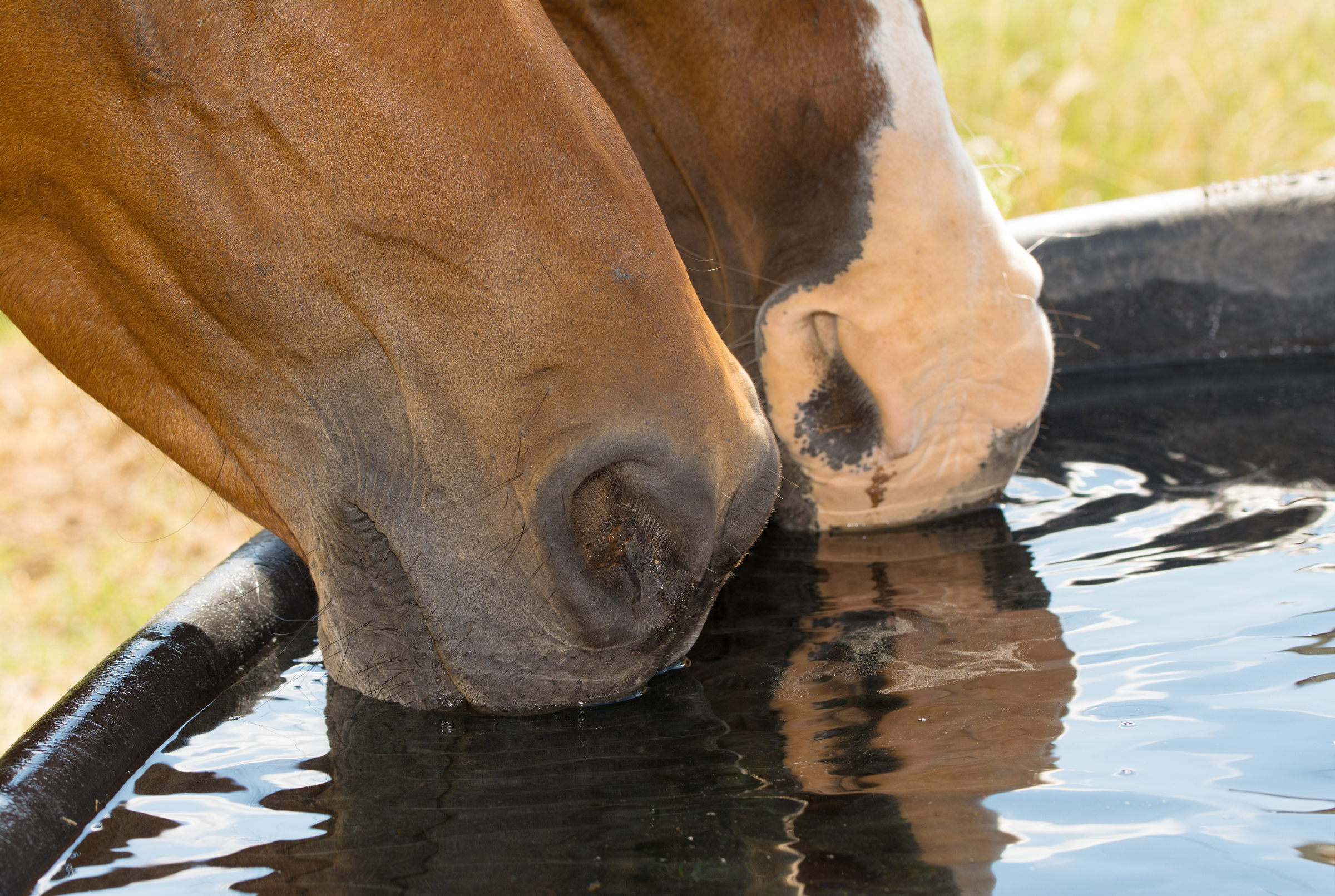
As we start to think about riding in the summer months, there are several environmental factors we must keep in mind. High temperature, high humidity, lack of air movement, poor ventilation and dehydration all increase the dangers of serious heat- and sun-related problems for horses, especially when they are expected to perform at intense levels.
Signs of Heat Stress
During exercise, there is a significant increase in the amount of heat produced by working muscles. Muscles cannot transform energy into movement with 100% efficiency. Horses transform energy to movement at approximately 25% efficiency. As a result, some of the energy is lost in the form of heat. The rate of heat production by working muscles is proportional to how hard the muscles work. Therefore, the faster a horse goes, the more heat it produces. The amount of heat a horse produces in a 100-mile endurance race would be enough to boil approximately 200 gallons of water. That’s approximately 2 gallons per mile!
Fortunately for the horse, it is able to dissipate around 97% of the heat it produces during an endurance race in cool-to-warm conditions. If it could not do that, its body temperature would increase by around 60°F/hour.
In response to exercise, a horse increases its sweating rate, moves more blood to the capillaries under the skin so that air can help cool the blood, and increases its rate of breathing in an effort to release this build-up of heat.
Commonly observed signs of heat stress are:
- Profuse sweating
- No sweating
- Rapid breathing rate – panting (>20 breaths/minute)
- Rapid heart rate (>50 beat/minute)
- Skin that is dry and hot
- Unusually high rectal temperatures (>100.4°F)
A simple pinch test can determine whether a horse is dehydrated as a result of heat stress. When you pinch the horse’s skin on the horse’s neck, it should resume its original position immediately. If the skin takes a while to resume to its normal position, it could be assumed that the horse is somewhat dehydrated.
Who is at Risk?
Obviously, horses that perform at high levels such as Thoroughbreds, Standardbreds, endurance and other performance horses will be influenced by heat stress during their training and competition. However, high-performance horses are not the only types of horses to be at risk.
Foals, especially the very young, have very poor thermo-regulating ability. They can overheat simply standing in the very hot sun. Add to this some activity, such as following an upset mare up and down a fence line, or weaning, and a serious problem can develop quickly.
Horses stabled in poorly ventilated barns and/or fed a poorly digestible forage, will produce a lot of heat during digestion, which can seriously affect horses prone to heat stress.
Additionally, any horse that does not have access to salt and electrolytes will be at greater risk of suffering heat stress.
Warning Signs and Treatment
Horses that are breathing with great difficulty, appear distressed, become weak, develop diarrhea or signs of colic or stop sweating are in serious distress and need immediate attention. A veterinarian should examine the horse as soon as possible and provide medical treatment. You should immediately get the horse into shade, and hose or sponge it with cool or even cold water. Direct the hose to the insides of the legs and the head and neck areas where large blood vessels are located near the surface.
Use fans to move air around the horse and encourage the horse to drink. It might take an hour or more to get all of the horse’s vital signs back to normal. Horses that have seriously overheated tend to be more susceptible to overheating in the future. Horses that have suffered a serious episode should have 10 to 14 days of rest with some turnout and a gradual return to work.
Most horses adapt to summer weather if given time to adjust gradually. Use a little common sense and keep a close watch on horses for signs of distress. Horses that are overweight and not used to regular hard physical activity are at the greatest risk.
Nutrition Contributes to Managing Heat Stress
A racehorse can lose up to 2.5 gallons of sweat per performance (work/race). This fluid isn’t just water; it contains a lot of salt. These salts, when broken down into their chemical components, are referred to as electrolytes. These are typically groups of different salts that contain such electrolytes as sodium, potassium, chloride, magnesium and calcium.
Electrolytes govern the transfer of water through cell membranes into or out of the cells. Thus, they function in getting the nutrients in and the waste products out. They are responsible for getting nerves to fire and muscles to contract. Essentially all of the physiological actions in the body require electrolytes. And importantly, they need to be present in the fluids in the appropriate amounts for these biochemical reactions to proceed in an orderly manner.
Low-Heat Feeding
Certain feeds create more heat from digestion than others. Fiber is digested in the hindgut by microbial fermentation, and depending on the quality of the fiber it can create a lot of heat during digestion. During very hot conditions, it is important to include highly digestible fiber sources such as beet pulp to decrease the thermal load of digestion.
Standlee Forage products are ideal for making sure your horse has the adequate nutritional balance they need to stay healthy during the summer. Check out some great Timothy Grass and Orchard Grass forage options to keep your horse cool at standleeforage.com/products.
This article was written by Dr. Tania Cubitt, PhD, of Equine Nutrition & Reproduction.


